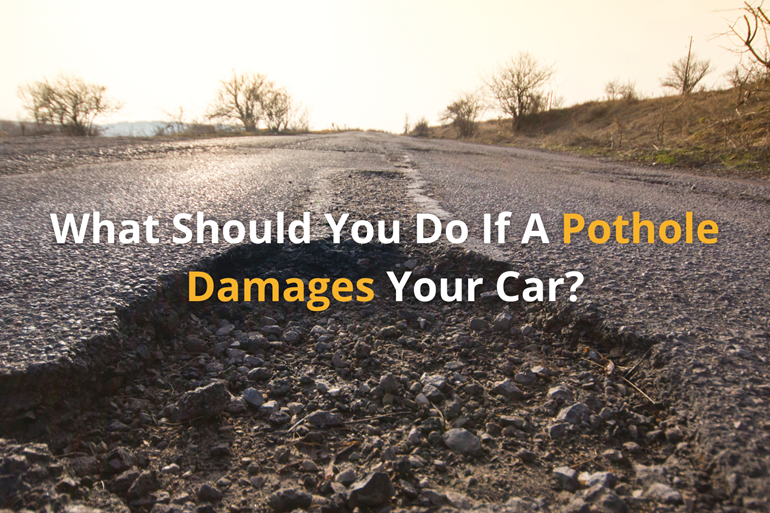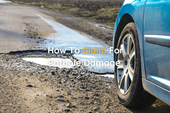
What Should You Do If A Pothole Damages Your Car?
Potholes Are Becoming All Too Common, Here's What You Need To Do If You Hit One...
Here in the UK, potholes in the road are a prevalent problem. The wet and cold weather associated with certain times of the year in Britain makes potholes a major concern. UK roads begin to form tiny fissures from tear and tear. As rain falls, water enters these cracks. As the temperature drops, this water freezes and then expands widening the fissures. Eventually, the ice melts leaving potholes on the surface of the road. When cars drive over them, they can incur a wide range of damage to their tyres, alloys and in more serious cases their suspension and undercarriage.
With wheel repair costs rising, in some cases to well over £1200, pothole damage can be expensive. It's worth considering tyre insurance and alloy wheel insurance to help spread the costs and protect yourself from any unexpected bills.
Read on to discover the important steps to take when a pothole damages your vehicle.
Assess the damage
Hitting a pothole, no matter what the speed, can be extremely damaging to your car. (Read our other blog on what potholes can do to your car).
Drivers encountering a pothole should pull over at the first opportunity it is safe. First, conduct a physical inspection of your vehicle. Walk around it and check all tyres and wheels for signs of visible damage. Next, get back behind the wheel and ensure that it centres correctly or if the vehicle is pulling to one side.
Check how the car feels to drive and note whether there are any unusual vibrations.
If you detect damage or your steering seems off, take your car to a garage or specialist in tyres as quickly as possible. Ignoring vehicle damage, especially steering problems can lead to serious accidents.
Make notes
Whether you plan to claim from either the local council or your insurance provider you will need evidence of the incident. Collecting information will also help you accurately report the pothole to protect other road users.
Never depend on your memory. Instead, return to the site of the pothole and make notes. If possible, use your smartphone to take pictures of the pothole, but only if the road is clear and safe for you to do so. A tip for taking photos is to place a familiar object next to the pothole for scale. A soft drink can is an ideal option.
Not down key details of the pothole location. Include the town, road name and the pothole’s position. If anyone saw when your car was damaged by the pothole, collect their contact details for corroboration.
"It may be possible to claim back your car repair costs from the council. Contact the local authority responsible for the road where the pothole is located and include all your details and supporting documents as proof of damage and repair."
Reporting the pothole
At high speeds, hitting a pothole can result in drivers losing control and crashing. This is why it's crucial for you to report any potholes you encounter so they can be repaired. Inform your local authority or, if the incident occurred on an A road, contact a member of Highways England.
Repairing your vehicle
Before getting any car repairs completed always collect and compare quotes to ensure you pay the lowest price possible. Make sure you keep all copies of any invoices, quotes and receipts that support your claim whether you are looking for compensation from the council or for your insurer to make a payment.
Claiming from the council
It may be possible to claim back your car repair costs from the council. Contact the local authority responsible for the road where the pothole is located and include all your details and supporting documents as proof of damage and repair. Councils are only responsible for pothole incidents if they were aware of them. If the pothole that caused your car damage was reported and the council failed to fix it, you can argue that they also failed in their duty to keep the road they are responsible for safety.
If the council rejects your compensation claim, you can appeal its decision. Request a copy of the local authority’s road inspection reports and compare them with its systems for inspecting and repairing roads to ensure that their decision is fair. If not, you can appeal. However, if the council still refuses to compensate you, you can either take legal advice or claim for your repairs via your insurance.
Claiming your car insurance
While some car insurance policies will cover potholes, claiming damage can impact your no claims bonus. As a result, you may find it more equitable to pay for incidental damage to your tyres or wheels yourself. However, not everyone has easy access to the funds required to repair damage from unexpected incidents caused by potholes.
For greater peace of mind, some drivers opt to take out specialised policies like tyre and alloy wheel insurance in addition to their standard car cover. If you want insurance dedicated to protecting your tyres and alloy wheels and that doesn't impact on your main car insurance 'no claims bonus', then visit Direct Gap to find out more.












